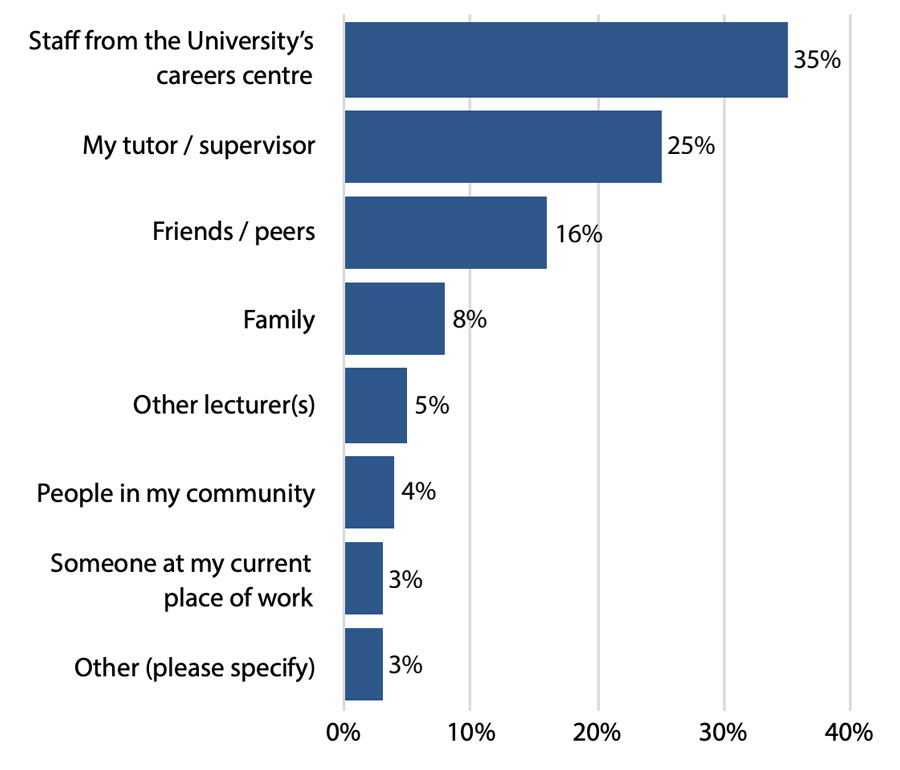- A new survey finds that international students at UK universities place a high priority on career services and work experience in planning their studies abroad
- But only about half of respondents say they are happy with the level of career supports available
A new UK study underscores the importance of career supports for international students. Paying more for less? Employability support for international students at UK universities was published earlier this month by the Higher Education Policy Institute (HEPI) in partnership with Kaplan International Pathways. It relies on findings from a series of focus groups as well as a broader survey of more than a thousand foreign students currently enrolled at British universities.
The vast majority of survey respondents (82%) said that the careers support they thought they would receive was either “important” or “very important” when choosing a university in the UK. An even larger proportion (92%) said the same of the employability skills they expected to gain at their universities.
Note though that those responses reflect the students’ expectations before arriving on campus. In a sharp contrast to those high expectations, the survey also found that only about half (52%) of currently enrolled students said that their university is doing a good job in providing those career supports.

The answer to this conundrum is to reconsider the support provided before, during and after study. [Students need] good pre-arrival information, equal access to work experience opportunities and easy access to support after graduation. Effective support is not cheap but it is clearly an appropriate use of the higher fees that international students pay.”
The survey also draws a sharp line under the importance of work-study integration for overall student satisfaction. Nearly six in ten (58%) said that employability skills were “embedded within their academic course”. And three in four of those students (75%) also reported being happy with their courses and their university. This compares to students for whom employability skills were not part of their courses, and where only 43% reported being happy with their choice of institution.
Along the same line, survey-respondents who reported a lack of employability skills integration in their coursework, were noticeably more likely to that, had they the choice to make over again, they would have chosen a different university.
The challenge of building work experience
The study report says of its focus group findings, “A majority of focus group participants acknowledged that in some countries there were now large numbers of graduates who had studied abroad, meaning that they felt less strongly positioned in what was a more competitive local labour market…Some of the students had specifically identified the opportunity for related work experience in the UK as a key part of what they were seeking from UK higher education experience.”Alongside that observation, the survey findings suggest that advance information on career prospects for the student’s chosen field of study (that is, prior to arrival on campus) have a major impact on student confidence about their chances of finding employment. Other aspects of career supports highlighted in the survey are targeted career services for foreign students, both with respect to seeking employment in the host country as well as in their home countries, and post-graduation supports. Roughly half of respondents (51%) said they thought career services should be available to alumni for one to five years after graduation.
In another finding that contrasts student expectation with reality, nearly four in ten respondents (39%) said that they had gained no work experience during their time at university. Roughly a quarter (23%) had done some paid work unrelated to their degree, with another third (35%) had gained some experience related to their studies (only about half of which was paid work).
Commenting on the report’s findings, Kaplan Managing Director Linda Cowan added, “If the UK is going to compete globally for international students, ensuring that they get the support they need to prepare for future careers, in the UK or their home country, would set the UK apart from other countries.”
A clear majority of students responding to the survey (71%) also said that they plan to stay in the UK to work after graduation. While the ambition of those students is clear, the survey raises some important questions about how well-prepared and confident they are about their pending job search after their degree studies.

